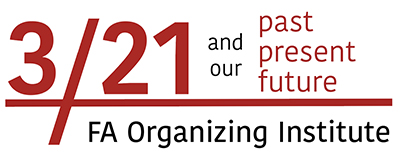Cynthia Eaton
For too long, unions have mistaken access for power. They need to get back to organizing and activating members. For too long, unions have given up on the goal of altering the power structure in favor of winning campaigns within the power structure. These quotes show that labor scholar and union organizer Jane McAlevey takes a no-holds-barred approach in her argument for what the labor movement must do to save unions in America. In a word: organizing. In two words: deep organizing. This is why the FA held an organizing institute on 3/3 with a focus on our past, present, and future. With the Janus decision pending, the college facing significant financial concerns and our FA contract expiring in 2019, there's never been a more critical time to engage in genuine deep organizing in the FA.
The 3/3 meeting—attended by over two dozen members—was just the start: our next organizing institute is on Wednesday, 3/21, from 3:30 to 6 pm, in the Montauk Point Room (Babylon Student Center, Ammerman Campus). And there will be more after that. Three models of unionism McAlevey characterizes three types of labor unions in her 2016 book No Shortcuts: Organizing for Power in the New Gilded Age:
Learning about Janus A commitment to an organizing model means talking directly with members. Thus, during the 3/3 organizing institute, members learned about the Janus v. AFSCME Council 31 Supreme Court case that's currently being decided, then talked at length about what to do about Janus. As we've discussed previously in The WORD, this case is about whether agency-fee payers should be required to pay the agency fee. In the 1977 Abood decision, the Supreme Court determined that even if an individual chooses not to join the union, they still benefit from the union's work (increased wages, benefits, retirement security, etc.), so requiring those non-members to pay an agency fee was deemed appropriate and legal. The FA refers to these few workers as agency-fee payers. It's important to note too that Abood also decided that non-members could not be forced to pay for the political activism of the union, which is why the FA only uses voluntary donations to its VOTE/COPE fund for political activities. The Janus case aims to overturn Abood, on the argument that all union activity is inherently political. The union's position is that since all workers benefit from the union's gains, all the workers should pay fair dues; nobody gets to be a "free rider." You can see what AFSCME has to say about the Janus case here. Understanding the impact Let's be clear: Any adverse decision in Janus threatens to overturn Abood and thus weaken the FA's ability to continue providing the bargaining power, legal representation and benefits that our members have enjoyed for decades. For example, the 3/3 organizing institute participants examined a case study of a local in Wisconsin that shows the devastating impact on their contract by comparing what the contract looked like when Wisconsin was union strong and after Wisconsin became a right-to-work state. The contract went from a 90-page document—detailing provisions about assignment and workload, salaries, benefits, dismissal, tenure, absences, evaluation, grievances and more—to a one-page document establishing "wages." Many Wisconsin locals saw an immediate, devastating impact on their contracts after the state became right to work, which is essentially what's being sought in Janus on the federal level. Staying strong The FA has no intention of being devastated. We know that cannot happen—and that's precisely because our members are strong, smart and commited to keeping the FA as healthy, active and member focused as it can be. We know that our members understand what's really behind the Janus case. We know that our members will stick with our union. We know that our members will find their own power and take the FA well into its future. How do we know these things? Consider just a sampling of the voices of participants from our 3/3 organizing institute. Join the energetic team that took our 3/3 meeting by storm—you can read some of their voices in the "Members speak out: Why I'm sticking with the union" article in this issue—by attending our second organizing institute on 3/21: contact Anita to RSVP by phone (631-451-4151) or email (anita@fascc.org). Our future depends on seizing this moment to get organized and stay organized. |
